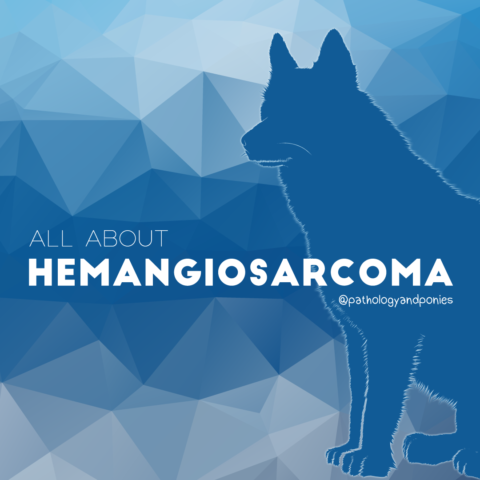Today’s path rounds are on 𝐇𝐢𝐬𝐭𝐨𝐩𝐡𝐢𝐥𝐮𝐬 𝐬𝐨𝐦𝐧𝐢!
𝐖𝐡𝐚𝐭 𝐢𝐬 𝐢𝐭?
𝐇𝐢𝐬𝐭𝐨𝐩𝐡𝐢𝐥𝐮𝐬 𝐬𝐨𝐦𝐧𝐢 is a bacterial disease of cattle that can cause a wide range of lesions throughout the body! Its primary role is as a respiratory pathogen, however.
𝐖𝐡𝐨 𝐠𝐞𝐭𝐬 𝐢𝐭?
Cattle primarily get this disease, specifically cattle on feedlots in North America.
𝐇𝐨𝐰 𝐝𝐨 𝐚𝐧𝐢𝐦𝐚𝐥𝐬 𝐠𝐞𝐭 𝐢𝐧𝐟𝐞𝐜𝐭𝐞𝐝?
Histophilus somni is considered to be a 𝐜𝐨𝐦𝐦𝐞𝐧𝐬𝐚𝐥 𝐛𝐚𝐜𝐭𝐞𝐫𝐢𝐚 in the mouth of cattle, meaning it is normally found there and generally does not cause issues. However, when cattle are stressed, the inhaled bacteria may gain access to the bloodstream and spread throughout the body, causing a 𝐬𝐞𝐩𝐭𝐢𝐜𝐞𝐦𝐢𝐚 (bacteria replicating in the blood). The most common cause of stress leading to this disease is cattle moving to the feedlot, where they comingle with all kinds of cows from all kinds of places and need to sort out their herd structure.
𝐖𝐡𝐲 𝐢𝐬 𝐭𝐡𝐢𝐬 𝐚 𝐩𝐫𝐨𝐛𝐥𝐞𝐦?
As mentioned before, this bacteria will cause a septicemia, which distributes the bacteria far and wide throughout the cow. It primarily lodges in the 𝐩𝐥𝐞𝐮𝐫𝐚 (covering of the lungs), heart, 𝐩𝐞𝐫𝐢𝐜𝐚𝐫𝐝𝐢𝐮𝐦 (covering of the heart), joints and even the brain.
In these areas, the bacteria adheres to the lining of blood vessels causing damage, and producing small 𝐭𝐡𝐫𝐨𝐦𝐛𝐢 (blood clots). These thrombi block blood flow within the vessel, causing areas of 𝐢𝐧𝐟𝐚𝐫𝐜𝐭𝐢𝐨𝐧 (tissue death due to lack of blood flow). Depending on the tissue, these infarcts can have different effects, but ultimately this disease usually leads to death for the cow.
𝐇𝐨𝐰 𝐢𝐬 𝐢𝐭 𝐝𝐢𝐚𝐠𝐧𝐨𝐬𝐞𝐝?
Typically, sudden death is the first clinical sign identified in a group of cattle. Depending on which tissues the bacteria lodged itself in, you may also see difficulty breathing, 𝐧𝐞𝐮𝐫𝐨𝐥𝐨𝐠𝐢𝐜 𝐬𝐢𝐠𝐧𝐬 like falling down or stumbling, lameness and swollen joints, or even unwillingness to move. Based on these clinical signs, and completing an on-farm necropsy, the veterinarian can make the diagnosis.
At necropsy, we see the results of the bacteria causing infarcts in multiple tissues. We can see 𝐟𝐢𝐛𝐫𝐢𝐧𝐨𝐮𝐬 𝐩𝐥𝐞𝐮𝐫𝐢𝐭𝐢𝐬 or 𝐩𝐞𝐫𝐢𝐜𝐚𝐫𝐝𝐢𝐭𝐢𝐬 (inflammation with release of the stringy material blood clots are made of), pale areas of dead muscle within the heart, and 𝐩𝐨𝐥𝐲𝐚𝐫𝐭𝐡𝐫𝐢𝐭𝐢𝐬 (inflammation of multiple joints). We can also see multiple small hemorrhages in the brain due to infarction. To confirm the diagnosis, PCR or bacterial culture can be done on tissue samples taken at necropsy to detect the bacteria.
𝐇𝐨𝐰 𝐢𝐬 𝐢𝐭 𝐭𝐫𝐞𝐚𝐭𝐞𝐝?
Usually this disease is treated with very strong antibiotics, however treatment is not always successful. Antibiotics usually need to be given early on in the course of the disease, before massive amounts of infarction has occurred, so having knowledgeable staff on farm who can identify sick cattle is crucial.
𝐏𝐡𝐨𝐭𝐨𝐬
1) Lungs with fibrinous pleuritis. Pathologists often describe this as a “bread and butter” appearance… i.e. you dropped a piece of bread with butter on it, and when you pick it up it has fine globs of butter sticking up. Gross.
2) Fibrinous pericarditis showing similar bread and butter around the heart.
3) A pale infarction in the heart muscle.
4) A joint with arthritis from the bacteria.
5-6) Examples of hemorrhage within the brain from the bacteria.
𝐒𝐨𝐮𝐫𝐜𝐞𝐬
Maxie, G. Jubb, Kennedy and Palmer’s Pathology of Domestic Animals, Volume 2. Sixth Edition.
Janzen, E.D. Histophilosis. Merck Veterinary Manual, 2020.
Photos 1-6 courtesy of University of Calgary Diagnostic Services Unit.










